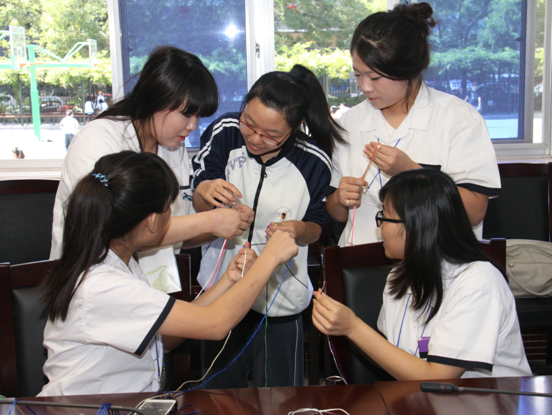

 |
| A delegation of an e-commerce high school from Gunpo, South Korea, learn how to tie a Chinese knot during a visit to their new sister school, Beijing International Vocational Education School. (Photo: the Official Website of the Beijing International Vocational Education School) |
China’s dazzling performance on the global diplomatic stage brings rich fruits upon her education collaboration with the rest of world. Analysts deem that cross-national education exchange will further beef up China’s cultural exchange with the world.
As Chinese leaders seek to deepen people-to-people connection, , education cooperation is a way to lay the groundwork for that appeal.
Data suggests that the number of joint-venture education institutions have increased from 71 in 1995 to 2,371 by the end of 2015. Currently, 560,000 students are registered in those institutions, and 460,000 of them are receiving tertiary education.
Thanks to China’s diplomatic efforts, educational cooperation has boomed in recent years.
Chinese President Xi Jinping, while paying a state visit to the US last September, announced to fund 50,000 students from both countries to study in the other country over the next three years.
The US, at the same time, announced a new initiative that aims at having 1 million American schoolchildren learning Mandarin Chinese by 2020. Besides, the two also pledged more cooperation between universities and think tanks.
In June, 2015, when Chinese Premier Li Keqiang visited France, both sides agreed to start negotiations for an internship program that allows each country to accept 1,000 interns from the other country. In November, the program was officially signed.
During a visit to the UK in 2014, Li also announced that China will send 10,000 public-funded students to the UK in the next five years.
Hoang Quy, a Vietnamese student studying in Yunnan Province, China, is benefiting from increasing educational cooperation between China and Vietnam.
According to statistics, around 13,000 Vietnamese choose to pursue further study in China annually. Thanks to his proficient Chinese, Hoang had his tuition cut into half. He planned to join the bilateral trade between Vietnam and China after graduation.
Experts pointed out that as an important part of foreign relations, education and people-to-people exchange can benefit deepen mutual understanding, and meanwhile, the quality of education will be improved as well.
They also believed that besides showcasing their own culture and skills, such interactions can also help to reduce disputes and increase friendship between exchange students.
 China has world's largest high-speed rail network
China has world's largest high-speed rail network Top beauties in Chinese provinces
Top beauties in Chinese provinces 600 people attend Lusheng playing contest in S China
600 people attend Lusheng playing contest in S China Engineer troop builds bridge in real combat conditions
Engineer troop builds bridge in real combat conditions You can urinate in public in Chongqing
You can urinate in public in Chongqing Rice terrace scenery in southwest China's Yunnan
Rice terrace scenery in southwest China's Yunnan 2016 Miss Chinatown USA pageant held in San Francisco
2016 Miss Chinatown USA pageant held in San Francisco Ancient pagodas across China
Ancient pagodas across China Wedding dress show up in the air
Wedding dress show up in the air Top 20 hottest women in the world in 2014
Top 20 hottest women in the world in 2014 Top 10 hardest languages to learn
Top 10 hardest languages to learn 10 Chinese female stars with most beautiful faces
10 Chinese female stars with most beautiful faces China’s Top 10 Unique Bridges, Highways and Roads
China’s Top 10 Unique Bridges, Highways and Roads Foreign Minister sends candid message
Foreign Minister sends candid message Laying off 1.8m workers challenges govt’s plans to cut industrial overcapacity
Laying off 1.8m workers challenges govt’s plans to cut industrial overcapacity Are these new therapeutic devices a medical miracle or the Emperor’s new cloak?
Are these new therapeutic devices a medical miracle or the Emperor’s new cloak? Seeking legal help brings shame on Chinese domestic violence victims despite law
Seeking legal help brings shame on Chinese domestic violence victims despite lawDay|Week